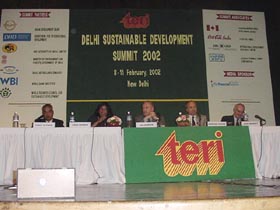10 February 2002: Plenary session 7 Food security and basic human needs
|
|
| Chairperson |
|
Mr Ian Johnson
Vice President, Environmentally and Socially
Sustainable Development, The World Bank, Washington, DC
"Today, if
we have the problem of access, tomorrow we shall have both, the problem of access and
availability."
|
|
| |
| Speaker |
|
Dr Vibha Dhawan
Director, Bioresources and Biotechnology Division, TERI
"Despite
everything, the reality is that today 800 million people cannot even afford two meals a
day."
|
|
| |
| Speaker |
|
Dr Guenther Fischer
Project Leader, Land Use and Land Cover Project,
International Institute for Applied Systems Analysis, Austria
"The
countries with least resources have the least capacity to adopt to climate change and are
hence most vulnerable."
|
|
|
|
| Speaker |
|
Mr Gokul Patnaik
Managing Director, Cebeco India Pvt. Ltd.,
India
"Even if food is available, it may not
be easily accessible to everyone."
"Profits
are important to business, but people come before profit."
|
|
| |
| Speaker |
|
Dr John Skerritt
Deputy Director, Research and
Development, Australian Centre for International Agricultural Research (ACIAR)
"Economic growth in East Asia is central to reduction of
poverty."
|
|
|
|
| Session summary |

Global population increase, decline in per
capita arable land and its degradation, and shortage of water and labour pose major
challenges to global food security and basic human needs, especially in developing
nations. Besides intensifying agriculture, the socio-economic conditions of people in
developing countries must be improved.
The Green Revolution’s benefits having plateaued, we should now focus on alternative
strategies to increase food production, improve storage and preservation, and enhance
nutritional quality of food. Biotechnology can provide food and nutritional security,
enhance production efficiency, reduce crop damage and food loss, promote sustainable
agriculture, protect the environment, and empower the rural sector through income
generation.
Genetic engineering holds a lot of promise. However, supply of nutritious food must be
complemented by access and adequate resources to acquire it.
Three valuable interventions to reduce rural poverty are agricultural R&D, education,
and road construction. Collaborations between developing and developed countries and
public-private partnerships are important.
Of the several actions required to address food security, the foremost is to remove trade
imbalances while investing in developing countries to ensure their competitiveness.
International public dialogue on science and technology in agriculture is important to
review options and risks. This would involve all stakeholders in agreeing on
environmentally and socially responsible paths.
We must invest in research for the public good and make the findings available to small
farmers, ensuring a focus on ‘productivity with a green face’. Investment
(through on- and off-farm activities) in rural development can remove urban bias.
Increased donor funding and realignment are critical to improve employment opportunities
and infrastructure, such as roads, education, and health.
Technological optimism coupled with conducive policies, political determination, sound
investments, and strategic partnerships is the key to success.
|
|
|